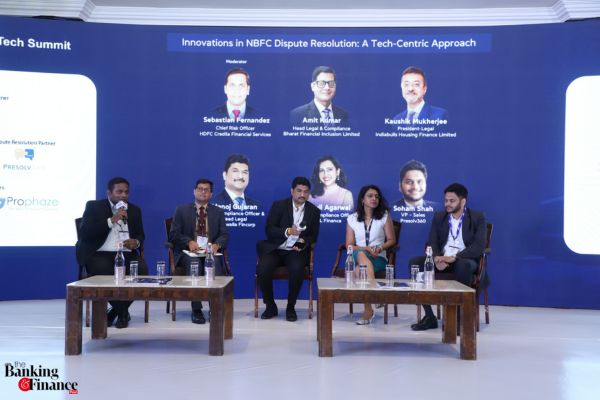The Elets 15th NBFC100 Tech Summit recently witnessed a thought-provoking panel discussion that centred around the advancements and challenges in NBFC dispute resolution through technological means. Delve deep into the in-depth look at the perspectives shared by the panelists:
Amit Kumar, Head Legal & Compliance, Bharat Financial Inclusion Limited
In a world swiftly migrating to digital spaces, Amit Kumar asserts the importance of creating a stable foundation before embarking on digitising the dispute resolution mechanism. “In the digital forum, regulations arise out of practices,” he remarked. This means that for the digital mechanism to be successful, an atmosphere that imbibes values such as faith, belief, equality, and justice needs to be established.
Highlighting the criticality of data privacy in today’s age, Kumar drew attention to a 2015 RBI directive which mandates obtaining specific consent when gathering customer data. The intent behind such regulations is not merely compliance; it’s about building a trustworthy relationship between financial institutions and their customers in an increasingly virtual world.
Manoj Gujaran, Chief Compliance Officer & Head Legal, Poonawalla Fincorp
Gujaran’s perspective provided a panoramic view of technology’s role in modern business processes. He began by stating the evident – technology’s relentless advance is transforming the way businesses operate. However, he swiftly juxtaposed this with a poignant observation about the indispensable nature of human touch.
Drawing a parallel to the synergy between automation and the human touch, Gujaran said, “Predictable behaviours can be addressed through automation, while unpredictable behaviours require a human touch.” The underlying theme of his perspective revolved around balance. Too much automation might alienate customers, while complete human dependence could render processes inefficient.
He also underlined the importance of transparency, especially when financial transactions are involved. For instance, online loan agreements should be comprehensive and unambiguous to prevent misunderstandings and last-minute changes that can give rise to disputes.
Mauli Agarwal, Chief Compliance Officer, IIFL Finance
Mauli Agarwal provided a bird’s eye view on the ethical dimensions surrounding the tech-centric approach to dispute resolutions. Leading with the paramountcy of data privacy and security, she discussed the intricate mesh of laws that address this concern, with the Data Protection Act being the most recent addition.
Agarwal emphasised the transparency in AI/ML models used in dispute resolutions. In her view, these models should be so transparent that any stakeholder, be it auditors, the NBFC itself, or the customer, should be able to trace back the decision-making process step-by-step.
Accountability is another cornerstone in this digital transformation. Clear delineations of responsibility are essential, especially when dealing with models susceptible to biases. Agarwal candidly addressed the worldwide concern of biases in AI models, suggesting a solution that calls for a diversified group to feed data into these models. Regular audits and continuous monitoring ensure that these models stay fair and free from inadvertent biases.
Finally, she stressed on customer education. Informing them about data handling processes and ensuring transparency in data purging, retention, and deletion policies will instill further confidence in the system.
Soham Shah, Vice President-Sales, Presolv360
Soham Shah painted a practical picture of the process of dispute resolution, dividing it into notices, collections, and litigations. Using the simple example of unpaid EMIs, he illustrated how technology is transforming the conventional approach.
He voiced a significant change in notice management. Gone are the days when legal notices were one-way streets. Shah spoke about the need to make this process more interactive, allowing customers to communicate back to the NBFCs. He showcased the ineffectiveness of traditional physical RPADs and how digital methods like WhatsApp and email can significantly improve communication efficacy.
Dwelling on the collection process, Shah recognized the immense potential for automation but was quick to add that this would always need to be complemented by human understanding.
Lastly, discussing litigations, Shah highlighted the changing landscape from traditional court visits to digital platforms like Presolv360, which are streamlining and digitising the entire arbitration process.
To sum it up:
The panel discussion at the Elets 15th NBFC100 Tech Summit provided a holistic understanding of the evolution of NBFC dispute resolution mechanisms in the era of technology. The core takeaway from the discussion is the harmony between technology and human touch, ensuring efficiency without compromising on empathy and understanding.
Elets The Banking and Finance Post Magazine has carved out a niche for itself in the crowded market with exclusive & unique content. Get in-depth insights on trend-setting innovations & transformation in the BFSI sector. Best offers for Print + Digital issues! Subscribe here➔ www.eletsonline.com/subscription/





















